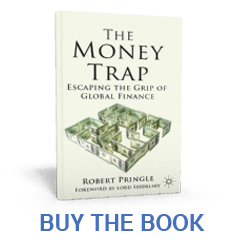We remain stuck in a bad money trap: why?
Revolt of the neglected and the exploited
The media support soft money
Ten years after publication of my book, and on both sides of the Atlantic, national economies are still in the grip of the bad money trap. How depressing. How debilitating.
Asset prices are sky high. Wages are sinking in real terms. All because of bad money policies that I analysed and exposed more than a decade ago.
Why has this harmful system remained essentially intact?
One factor that deserves more attention than it gets is the role of the mainstream media, and underlying that deep social rifts enhancing the baneful power of the intellectual and financial cliques
Bad money and illusions of asset inflation
Society is polarised between the upper, politically dominant, class and “the rest”. Members of the first group feel entitled to their rewards. “We earned them!” . They see themselves as members of a group leading society in a progressive direction. The meritocrats worked very hard through school and university to obtain advanced qualifications.
They have the skills, contacts and determination to pursue careers in demanding occupations.
This group looks to the so-called quality media – the main news channels, especially in Britain, the BBC – to pick out what is important in the daily flow of news. This shapes how its members perceive social reality.
“Globalists”…
In recent years, this group has meshed with many self-made entrepreneurs. This elite has a particular set of ethical and political values, views about the ills of society, about the way forward, and about what needs to be done. It is progressive, egalitarian, widely-travelled, and strongly opposed to all form of discrimination.
It tolerates financial markets, but believes they need strict international regulation; it favours a large public sector and active fiscal and monetary policies. Accompanying this is a worldview favouring globalisation. It celebrates the vision of a world without borders.
For them, governments and official agencies should view money as no more – and no less – than a technique of control, a tool of policy.
…and benighted nationalists
The “rest” is more rooted in home and nation. They honour its cultures and traditions. For them, patriotism is nothing to be ashamed of. For such Brits, Brexit was a matter of sovereignty. For half of all Americans, Donald Trump represented a demand to be heard and respected – hence they could overlook his personal and political failings. They have a different set of ideals, and different vision of a good society and what is needed to make a better country from those of the elite.
This group has a vested interest in sound money – a money that resists manipulation.
These groups have been moving further apart in financial, cultural and economic terms. The rapidly widening economic gap is no accident. It results from the monetary policies deployed by the state strongly supported by globalist elites and the mainstream news media. These policies call for constant economic and monetary stimulus. These policies are supposed to maintain employment and demand to benefit the entire economy but more directly they dramatically raise house prices and other assets, stocks and all the investments with disproportionate gains for the upper income groups. Their beliefs about justice coincide with their pecuniary self-interest.
The media outlets that they follow thus naturally develop a bias in favour of such policies, and preach progressive, egalitarian policies to readers and viewers who are in reality busily consolidating their privileges.
Yet the intellectuals and writers involved strongly believe that they articulate high social ideals, the best values and aspirations of society as a whole. They believe they advance reason and enlightenment.
The real charge is not that of hypocrisy but rather of denying agency to others, to “the rest”. There is no respect for alternative visions of the future. The views of “conservatives” are typically dismissed as being uneducated, tribal and reactionary.
Groupthink….
Yet the aspirations and ideals of the conservative, so-called ”left behinds” were until quite recently the cement that held our societies together. They embraced shared patriotism, faith and shared ideals of freedom and opportunity. Now these have become “unAmerican” or “Not British” and “white” .
This unhealthy trend to what George Orwell termed “groupthink” among the political class has helped Big Tech to link with Big Finance and Big Media at the apex of our power structure. So we have a vicious circle: media power equals political power equals wealth and the winner takes all. This power structure has emerged at a time when one group of winners – the meritocrats – has become increasingly detached from society. They are detached not only in terms of their wealth but also in their political, social and cultural attitudes. They own, control, edit and write most of what passes for “quality journalism” globally. In America, the star here is the New York Times.
Information wars in America
In America, there is a special factor at work – the influence of the intelligence agencies discussed recently in this insightful blog post by Larry White.
While the monetary system is not a focus of the “information war” currently under way in the run-up to the midterm elections, the outcome of struggles between competing factions (notably between globalists and nationalists) could have a huge indirect impact over the longer term.
…perpetuates the bad money trap
This is how bad money is kept going. As I discussed already in my 2019 book,The Power of Money, bad policies are supported by entrenched interests, corruption, cronyism and the illusions of asset inflation. But beyond these, the media peddles views it regards as progressive and liberal while actually flattering readers drawn from groups that benefit from the money trap.
Current social unrest in many developed countries may well reflect, at least in part, pent-up frustration with the way that bad money hurts the middle classes.
The challenge will be to channel that anger and frustration to a demand for monetary reform.

